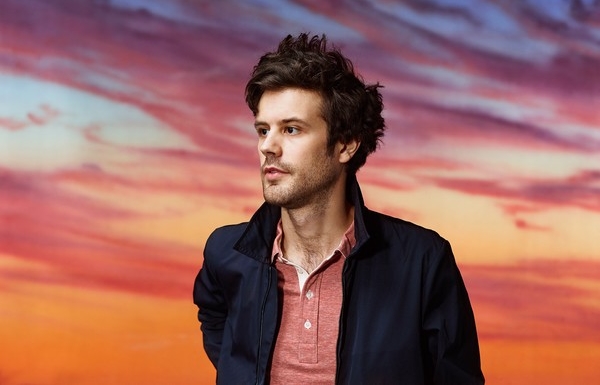“A love letter to my wife?” he says, looking unimpressed. It must be said that for the most part, Angelakos is a pleasant, funny guy, self-deprecating and considered. This issue has clearly struck a nerve, however, and as our conversation unfolds it starts to become apparent why that is. “I don’t know where that idea came from, because it’s not true. Some songs are about her, but there are a lot of songs that don’t have anything to do with her at all. There are a couple of songs there about my brother, songs about the other band members. Songs about dealing with and accepting love, which isn’t as easy as it sounds, it can be quite difficult, especially if you’re not used to it. It’s something I’ve never been truly comfortable with, trusting vulnerability.”
As he talks, Angelakos moves around restlessly, pivoting on the spot or gesturing with his hands. This is not at all borne of nervousness or idle pontification. In fact, he is a strikingly confident speaker, direct and incisive.
“All I really wanted to do was make a simple pop record, but it ended up being this multi-layered whatever. There’s not really a theme. When people talk about [debut EP] Chunk Of Change and it being dedicated to my girlfriend at the time, that was actually 100 per cent true. Gossamer was dedicated to my wife and my friends, and dealt with this thematic, manic episode. And now this record is for them too, sure. It’s for my wife, it’s for my friends, but it’s much more of a concert record. It’s me putting all of the things that I’d experienced growing up, all of the things going on in my life, through this filter of me as a 19-year old kid hanging out in the park. That’s the theme, really. I can’t think of anything else,” he laughs. “It’s certainly not a love letter.”
If not a love letter, the lens of 19-year old Angelakos is still an affecting point of view. Most of us can vividly recall the frustrations and aspirations of our teenage years, and to confront that figure from the past with our future self – in front of an audience, no less – takes a level of bravery few could muster. When asked how he faces such public exposure, though, the Massachusetts vocalist and keyboardist doesn’t feel like he responds at all differently from anybody else.
“Well, if you were in my position, would you feel freaked out? It can be totally scary, but that’s also the most therapeutic part. You’re up there and you have to own it. You can’t back down from it. The one thing I can say that I think is super, brutally honest about Passion Pit, is that as nerve-racking as [performing] can be, there’s strength in sharing it with other people. But you know how lucky I am to be able to do this as a living? It’s an amazing opportunity. I’m so grateful, and I mean, this is what I know how to do. To be honest, and put that into making music.
“With this record I wanted to be more upfront, I wanted to be clearer and share more. I can’t think of anything better than that, can think of nothing more therapeutic, and that’s what it’s all about. If people want to connect with me, I’d rather connect with them musically than on Twitter. If people pay money for tickets to see us live, then I want them to know me by hearing good music. That’s the person I want them to see, because that’s who I am.”
In truth, there is no finer stance then letting your art speak for your intentions. Any explanation or close scrutiny of the artist can easily overwhelm the purpose of the music, and yet most of us remain ravenous to glean more about the people behind the songs that impact us so sweetly. Just don’t expect to see Passion Pit start replying to your YouTube comments any time soon.
“I used to,” Angelakos chuckles. “I can’t anymore. It doesn’t strike me as being particularly truthful. I don’t think people are often inclined to be honest when they post things online, so I don’t read it. I don’t know a lot of what people say, because it reached a point where I’d read certain things and I’d have this weird gut reaction. It felt unhealthy. It also takes too much time and focus. I work on a lot of other projects, which helps me to keep Passion Pit in line with what I’ve always wanted it to be. There will always be other things in my mind, other projects, and so I don’t get distracted and try to force [Passion Pit] somewhere else.
“Like recording this new album, I really found Passion Pit to be what we’d always imagined it to be. Looking back to when it started in 2008 to where it sits now, I’m pretty happy with it. I think every record has been moving forward – each song, the lyrics are all building on each other. It’s nice. This is exactly how I wanted it all to happen.”
Given the legion of fans and the top-tier music festivals to which Passion Pit are invited around the world, it’s nice to know that Angelakos has reached these heights without losing sight of what made him want to release music in the first place. That said, there is a reverse side to ambition; after performing at celebrated gigs like Glastonbury Festival or featuring on Saturday Night Live, there exists the potential for disconnection. Is this the ceiling? Who are you once the applause dies down and the stage lights dim?
“I think there’s a certain mindset that a lot of artists have to be aware of. I’m not hugely famous. I’m still able to put out records; I’m still able to talk to people about music. Quite honestly, I’ll do what I have to do, whatever it takes, to do what I love and be able to reach people. And I’m really not at that level [of fame]. You see some of them, and their lives are fucked up. Their lives. Are fucked. Up. I don’t think I’m ever going to have that. As long as I keep getting asked to play festivals, play gigs and reach more people, as long as I get to keep doing what I want to be doing, I’m happy.”
BY ADAM NORRIS

